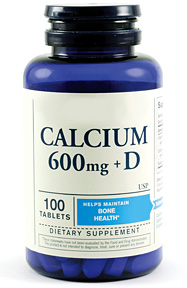While bone density can improve at any stage of life, the most critical time is during the pre- and early-puberty periods. Regular exercise for children is the key to developing healthy bone structure and promoting long-term injury prevention.
Younger children and teens need at least an hour of physical activity every day that includes strengthening exercises. Adults should get at least 30 minutes of moderate physical activity every day. Simple activities like walking and stair climbing will strengthen bones, but any form of resistance exercise, such as weight-lifting, is ideal. In addition, exercise benefits the elderly by improving balance and coordination, thus resulting in fewer falls, which as we discussed previously, is extremely important to their health and function.
Eat Right and Take Bone-Building Supplements
Another aspect of developing healthy bones is eating healthy foods and avoiding unhealthy ones. Due to the mass consumption of processed, overcooked and nutrient-depleted foods, most people absorb and utilize too little calcium and vitamin D for good bone health - even if they're eating foods that are high in both. However, eating a diet that consists primarily of fresh organic fruits and vegetables will do the trick, since most contain healthy levels of calcium, vitamin D and many other beneficial vitamins and minerals that are readily absorbed by the body.
 That said, for most individuals, dedicating oneself to getting enough calcium and vitamin D through an organic diet can be challenging, so supplementation becomes necessary. The best supplements incorporate organically complexed (carbon-bond) nutrients from live, whole-plant foods of the highest quality that avoid the use of synthetic chemical ingredients, preservatives, binders, coatings, and other non-natural substances as much as possible. Also remember that it's important to get adequate amounts of calcium and vitamin D, since the latter improves absorption of the former.
That said, for most individuals, dedicating oneself to getting enough calcium and vitamin D through an organic diet can be challenging, so supplementation becomes necessary. The best supplements incorporate organically complexed (carbon-bond) nutrients from live, whole-plant foods of the highest quality that avoid the use of synthetic chemical ingredients, preservatives, binders, coatings, and other non-natural substances as much as possible. Also remember that it's important to get adequate amounts of calcium and vitamin D, since the latter improves absorption of the former.
What about dairy products? Contrary to popular belief and advertising, dairy products, including cow's milk, while containing high levels of calcium, are in a form that is not compatible with human digestion, assimilation and absorption. Typically, they also are high in saturated fat, can have high levels of pesticides, antibiotics and hormones, and if pasteurized, contain deactivated enzymes caused by high heat. Dairy products contain lactose, which many people have difficulty absorbing due to the lack of the digestive enzyme lactase. Many infants and small children, as well as some adults, have allergies to dairy products, especially milk. That means we need to find other sources of bone-building nutrients in our food or make sure we are taking the appropriate supplements to held build healthy, strong bones.
The Power of Good Living
As a final recommendation, it's important to appreciate that bone-weakening can be averted and calcium absorption enhanced by abstaining from smoking, limiting alcohol intake, and decreasing or eliminating consumption of caffeine and soft drinks. Of course, these are all things we should be limiting and/or eliminating from our lives for various health reasons, not just in terms of bone health.
Do You Know How Strong Your Bones Are?
Women over 65 years of age and those who have suffered low-trauma fractures after age 50, as well as those with significant risk factors for low bone density, should be screened periodically to assess their bone health. Bone-density tests are safe, painless and quick, and are a good indictor of bone health.

